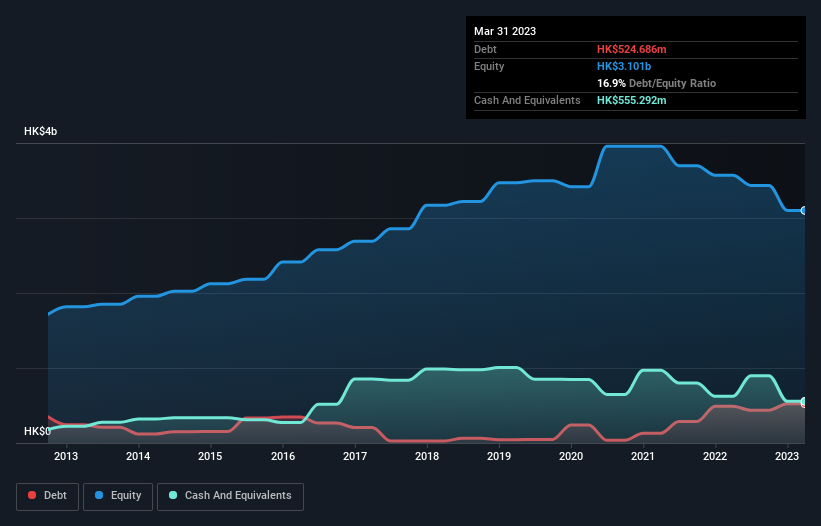Is Vitasoy International Holdings (HKG:345) A Risky Investment?

The external fund manager backed by Berkshire Hathaway's Charlie Munger, Li Lu, makes no bones about it when he says 'The biggest investment risk is not the volatility of prices, but whether you will suffer a permanent loss of capital.' So it might be obvious that you need to consider debt, when you think about how risky any given stock is, because too much debt can sink a company. As with many other companies Vitasoy International Holdings Limited (HKG:345) makes use of debt. But is this debt a concern to shareholders?
When Is Debt A Problem?
Generally speaking, debt only becomes a real problem when a company can't easily pay it off, either by raising capital or with its own cash flow. If things get really bad, the lenders can take control of the business. However, a more common (but still painful) scenario is that it has to raise new equity capital at a low price, thus permanently diluting shareholders. Of course, the upside of debt is that it often represents cheap capital, especially when it replaces dilution in a company with the ability to reinvest at high rates of return. The first thing to do when considering how much debt a business uses is to look at its cash and debt together.
Check out our latest analysis for Vitasoy International Holdings
What Is Vitasoy International Holdings's Debt?
You can click the graphic below for the historical numbers, but it shows that as of March 2023 Vitasoy International Holdings had HK$524.7m of debt, an increase on HK$489.8m, over one year. However, it does have HK$555.3m in cash offsetting this, leading to net cash of HK$30.6m.

A Look At Vitasoy International Holdings' Liabilities
We can see from the most recent balance sheet that Vitasoy International Holdings had liabilities of HK$2.47b falling due within a year, and liabilities of HK$277.0m due beyond that. Offsetting these obligations, it had cash of HK$555.3m as well as receivables valued at HK$1.00b due within 12 months. So it has liabilities totalling HK$1.19b more than its cash and near-term receivables, combined.
Of course, Vitasoy International Holdings has a market capitalization of HK$12.1b, so these liabilities are probably manageable. But there are sufficient liabilities that we would certainly recommend shareholders continue to monitor the balance sheet, going forward. While it does have liabilities worth noting, Vitasoy International Holdings also has more cash than debt, so we're pretty confident it can manage its debt safely.
Notably, Vitasoy International Holdings made a loss at the EBIT level, last year, but improved that to positive EBIT of HK$24m in the last twelve months. There's no doubt that we learn most about debt from the balance sheet. But ultimately the future profitability of the business will decide if Vitasoy International Holdings can strengthen its balance sheet over time. So if you want to see what the professionals think, you might find this free report on analyst profit forecasts to be interesting.
Finally, a business needs free cash flow to pay off debt; accounting profits just don't cut it. While Vitasoy International Holdings has net cash on its balance sheet, it's still worth taking a look at its ability to convert earnings before interest and tax (EBIT) to free cash flow, to help us understand how quickly it is building (or eroding) that cash balance. Over the last year, Vitasoy International Holdings actually produced more free cash flow than EBIT. That sort of strong cash conversion gets us as excited as the crowd when the beat drops at a Daft Punk concert.
Summing Up
We could understand if investors are concerned about Vitasoy International Holdings's liabilities, but we can be reassured by the fact it has has net cash of HK$30.6m. And it impressed us with free cash flow of HK$315m, being 1,309% of its EBIT. So we don't have any problem with Vitasoy International Holdings's use of debt. When analysing debt levels, the balance sheet is the obvious place to start. However, not all investment risk resides within the balance sheet - far from it. To that end, you should be aware of the 1 warning sign we've spotted with Vitasoy International Holdings .
At the end of the day, it's often better to focus on companies that are free from net debt. You can access our special list of such companies (all with a track record of profit growth). It's free.
New: Manage All Your Stock Portfolios in One Place
We've created the ultimate portfolio companion for stock investors, and it's free.
• Connect an unlimited number of Portfolios and see your total in one currency
• Be alerted to new Warning Signs or Risks via email or mobile
• Track the Fair Value of your stocks
Have feedback on this article? Concerned about the content? Get in touch with us directly. Alternatively, email editorial-team (at) simplywallst.com.
This article by Simply Wall St is general in nature. We provide commentary based on historical data and analyst forecasts only using an unbiased methodology and our articles are not intended to be financial advice. It does not constitute a recommendation to buy or sell any stock, and does not take account of your objectives, or your financial situation. We aim to bring you long-term focused analysis driven by fundamental data. Note that our analysis may not factor in the latest price-sensitive company announcements or qualitative material. Simply Wall St has no position in any stocks mentioned.
About SEHK:345
Vitasoy International Holdings
An investment holding company, manufactures and sells food and beverages in Mainland China, Hong Kong, Australia, New Zealand, and Singapore.
Excellent balance sheet with proven track record.


